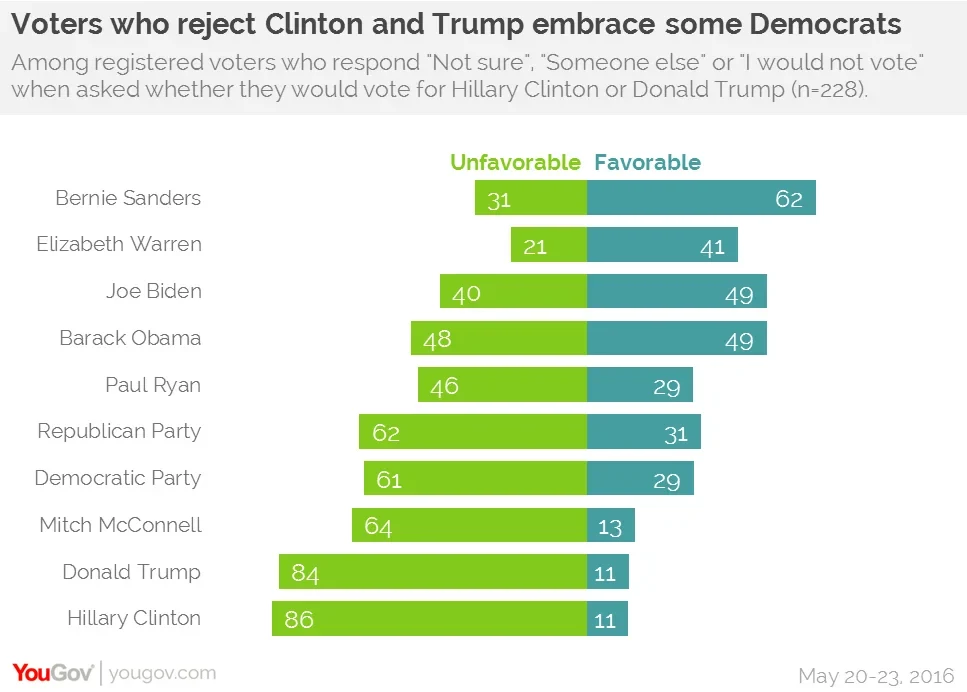Among those who say “neither” to Hillary Clinton and Donald Trump, Clinton has a clear advantage
The latest YouGov/Economist Poll finds Hillary Clinton and Donald Trump nearly tied among registered voters, 42% for Clinton and 41% for Trump. That leaves a large number of voters in a third column: Neither. These are the 17% of registered voters who instead say they are “Not sure” or express support for a third candidate, or say they would not vote at all in a Trump-Clinton race.
As YouGov’s own Kathy Frankovic pointed out last week, a large contingent of this group are Bernie Sanders supporters who, at least right now, refuse to express support for Sanders’s primary rival Hillary Clinton. It is often assumed these Sanders primary voters will eventually, come around – but even then, likely Democratic primary voters make up only a minority of those who reject both Hillary Clinton and Donald Trump. What about the 'Neithers' as a whole?
The analysis does make one thing clear: they really don’t like Clinton or Trump. 86%, in fact, have an unfavorable opinion of the former Secretary of State, and 84% have an unfavorable opinion of her likely general election opponent. They also have equal antipathy for both the Democratic Party (61% unfavorable) and the Republican Party (62%). But they are relatively favorable towards several Democrats included in the poll, who appear likely to endorse, and even campaign, on behalf of their party's nominee. The only three with clearly positive ratings are Bernie Sanders, liberal hero Elizabeth Warren and Vice President Joe Biden. Prominent Republicans like House Speaker Paul Ryan and Senate Majority Leader Mitch McConnell are much less popular.

There is more evidence of a leftward tilt. 45% of Neithers self-identify as Democrats or as Democrat-leaning independents, against 35% who at least lean Republican. Only 17% are independents who lean neither way.
By ideology, Neithers break down similarly to the general population, with 28% identifying as liberal, 35% as moderate, and 36% as conservative. On the issues, however, they lean towards liberal positions – and against some of the positions that have defined Trump’s primary campaign. They favor single-payer healthcare by 47% to 34%, free college tuition by 47% to 33% and raising the minimum wage to $15 an hour by 50% to 33%. These are all flagship policies for Bernie Sanders, but Clinton’s platform already addresses these issues in some way. She also advocates raising taxes on the wealthy; 67% of Neithers support raising taxes on families making $250,000 or more. 51% say the government is not doing enough on climate change and only 21% say it is doing too much.
As for Trump’s policies? By 60% to 31% the Neithers oppose his plan to ban Muslim immigration until the country can “figure out what’s going on”. That’s a much wider opposition than among the general population, who divide 46% for to 44% against the policy. Neithers also oppose Trump’s border wall by 55% to 31%, and 59% favor a path to citizenship for undocumented immigrants who fulfill certain requirements.
It’s possible the more liberal members of this group will be less likely to vote than the others (Neithers are disproportionately young: 57% are under-45). It’s also possible a liberal third-party candidate like Jill Stein of the Green Party gains enough momentum to pull some of the left-leaning voters away from Democrats. But assuming Hillary Clinton secures the nomination and the support of her fellow Democrats, she is positioned to grow her support with this group more than Trump.
See the Economist/YouGov results
Economist/YouGov poll archives can be found here.









